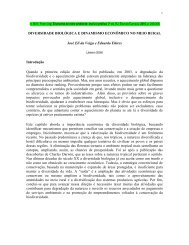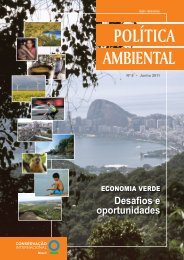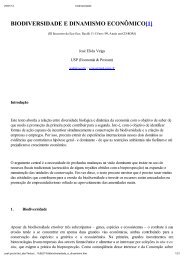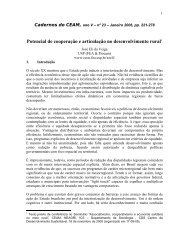sustainable development 20 years on from the ... - José Eli da Veiga
sustainable development 20 years on from the ... - José Eli da Veiga
sustainable development 20 years on from the ... - José Eli da Veiga
Create successful ePaper yourself
Turn your PDF publications into a flip-book with our unique Google optimized e-Paper software.
62<br />
for groups that are usually bypassed by <strong>the</strong> c<strong>on</strong>venti<strong>on</strong>al model of ec<strong>on</strong>omic growth (i.e., <strong>the</strong> poor, young<br />
people and women) (United Nati<strong>on</strong>s, <str<strong>on</strong>g>20</str<strong>on</strong>g>10a).<br />
Although <strong>the</strong> Latin American countries have been moving towards policies that will promote both<br />
<str<strong>on</strong>g>sustainable</str<strong>on</strong>g> <str<strong>on</strong>g>development</str<strong>on</strong>g> and <strong>the</strong> creati<strong>on</strong> of jobs and o<strong>the</strong>r types of employment that provide workers<br />
with social benefits, <strong>the</strong> implementati<strong>on</strong> of <strong>the</strong>se policies is still in its initial stages. There are, however,<br />
some nati<strong>on</strong>al programmes that are taking a “green jobs” approach. Examples include Brazil’s initiative<br />
in <strong>the</strong> area of biofuels and low-cost housing c<strong>on</strong>structi<strong>on</strong>; ecotourism and <str<strong>on</strong>g>sustainable</str<strong>on</strong>g> farming projects in<br />
Costa Rica and Guatemala; and <strong>the</strong> promoti<strong>on</strong> of infrastructure that can be a<strong>da</strong>pted to cope with climate<br />
change in Haiti (ILO, <str<strong>on</strong>g>20</str<strong>on</strong>g>09a).<br />
As of <str<strong>on</strong>g>20</str<strong>on</strong>g>08, <strong>the</strong>re were nearly 2.6 milli<strong>on</strong> jobs (6.7% of employment in <strong>the</strong> formal sector) in<br />
Brazil that could be described as “green”. These jobs are in six sectors of ec<strong>on</strong>omic activity that are<br />
classified as low polluters or as doing little harm to <strong>the</strong> envir<strong>on</strong>ment (see table I.6). Most green jobs are in<br />
transport and renewable energy industries; o<strong>the</strong>rs are in recycling, forestry explorati<strong>on</strong> and<br />
telecommunicati<strong>on</strong>s. The most promising sectors in terms of <strong>the</strong>ir potential for creating green jobs in<br />
Brazil are <strong>the</strong> recycling industry, biofuels and <str<strong>on</strong>g>sustainable</str<strong>on</strong>g> c<strong>on</strong>structi<strong>on</strong> (ILO, <str<strong>on</strong>g>20</str<strong>on</strong>g>09b).<br />
Table I.6<br />
BRAZIL: NUMBER OF GREEN JOBS IN EACH ECONOMIC ACTIVITY, <str<strong>on</strong>g>20</str<strong>on</strong>g>08<br />
Ec<strong>on</strong>omic activity<br />
Number of jobs<br />
Forestry management and producti<strong>on</strong> 139 768<br />
Renewable energy (generati<strong>on</strong> and distributi<strong>on</strong>) 547 569<br />
Sanitati<strong>on</strong>, waste and envir<strong>on</strong>mental risk management 303 210<br />
Maintenance, repairs and restorati<strong>on</strong> of products and materials 435 737<br />
Public transit and alternative land-based and aer<strong>on</strong>autic means of transport 797 249<br />
Telecommunicati<strong>on</strong>s and teleph<strong>on</strong>y 429 526<br />
Source: Internati<strong>on</strong>al Labour Organizati<strong>on</strong> (ILO), Empregos verdes no Brasil: quantos são, <strong>on</strong>de estão e como evoluirão nos<br />
próximos anos, Brasilia, <str<strong>on</strong>g>20</str<strong>on</strong>g>09.<br />
In order to take advantage of <strong>the</strong> potential offered by green jobs, well-structured policies are<br />
needed to maximize <strong>the</strong> opportunities and minimize <strong>the</strong> social costs of <strong>the</strong> transiti<strong>on</strong>. The Green Jobs<br />
Initiative was launched in September <str<strong>on</strong>g>20</str<strong>on</strong>g>08 by UNEP, ILO and <strong>the</strong> Internati<strong>on</strong>al Trade Uni<strong>on</strong><br />
C<strong>on</strong>federati<strong>on</strong> (ITUC) and <strong>the</strong> Internati<strong>on</strong>al Organizati<strong>on</strong> of Employers (IOE) (UNEP/ILO, <str<strong>on</strong>g>20</str<strong>on</strong>g>08;<br />
Poschen, <str<strong>on</strong>g>20</str<strong>on</strong>g>07). This programme supports policymaking initiatives through: (a) active participati<strong>on</strong> in<br />
high-level internati<strong>on</strong>al debates <strong>on</strong> climate change and <str<strong>on</strong>g>sustainable</str<strong>on</strong>g> <str<strong>on</strong>g>development</str<strong>on</strong>g>; (b) global and countrylevel<br />
analyses of <strong>the</strong> potential for green job creati<strong>on</strong>; (c) direct technical assistance for governments and<br />
civil society stakeholders; and (d) training for civil servants and for civil society stakeholders.<br />
4. Envir<strong>on</strong>mental performance at <strong>the</strong> sectoral level<br />
As <strong>the</strong> regi<strong>on</strong>’s producti<strong>on</strong> patterns evolve, <strong>the</strong> various sectors of <strong>the</strong> ec<strong>on</strong>omy must find ways of dealing<br />
with <strong>the</strong>ir envir<strong>on</strong>mental impacts. The challenges that <strong>the</strong>y face in this respect are formi<strong>da</strong>ble, but each<br />
industry is making headway. The regi<strong>on</strong>’s experiences with <str<strong>on</strong>g>sustainable</str<strong>on</strong>g> producti<strong>on</strong> and c<strong>on</strong>sumpti<strong>on</strong><br />
provide valuable cross-cutting less<strong>on</strong>s (see box I.4). Chapter II examines <strong>the</strong> implementati<strong>on</strong> of ec<strong>on</strong>omic<br />
instruments for envir<strong>on</strong>mental management and chapter III looks at private-sector initiatives for<br />
supporting sustainability.













